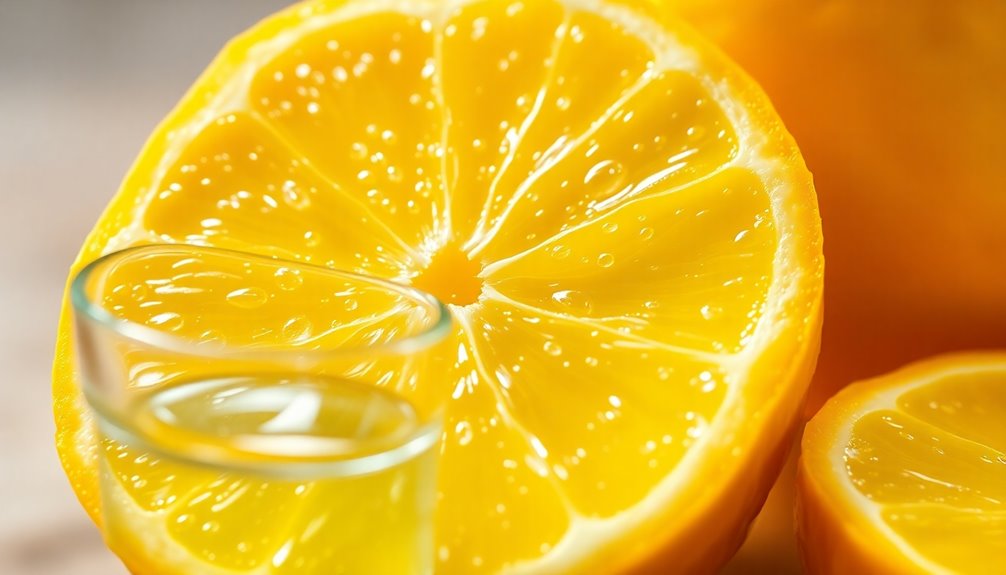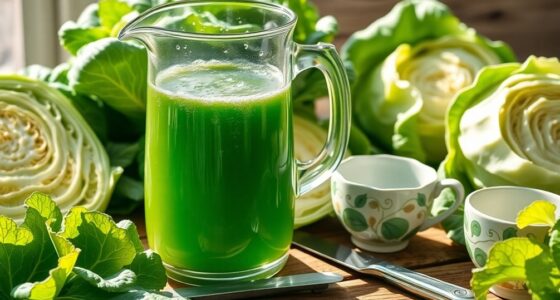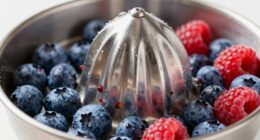A medium lemon usually gives you about 3 tablespoons of juice, while larger ones can produce up to 4 tablespoons or even a quarter cup. Small lemons, on the other hand, typically yield around 2 tablespoons. Remember that the ripeness and variety of the lemon can affect these amounts. If you want to maximize your juice extraction or learn about more effective techniques, just keep going for more helpful insights!
Key Takeaways
- A medium lemon typically yields about 3 tablespoons of juice.
- Larger lemons can produce up to 4 tablespoons or 1/4 cup of juice.
- Small lemons generally yield around 2 tablespoons of juice.
- Meyer lemons can provide between 3 to 6 tablespoons when ripe.
- Juice yield can vary based on ripeness and lemon variety.

Have you ever wondered just how much juice you can get from a lemon? It's a common question for anyone who loves cooking or baking with this zesty fruit. The juice yield from a squeezed lemon can vary significantly based on its size and variety, so knowing what to expect can help you plan your recipes better.
For instance, a medium lemon typically yields about 3 tablespoons of juice. If you're using larger lemons, you might get up to 4 tablespoons, or even a quarter cup! On the other hand, if you happen to have a small lemon in your kitchen, don't be surprised if it only produces around 2 tablespoons of juice.
When it comes to preparing dishes that need a substantial amount of lemon juice, size really does matter. For example, if you find yourself needing 1 cup of lemon juice, you'll need about 5.25 to 5.5 medium lemons or about 4 large lemons. That's a fair number of lemons to squeeze, but it's nice to know exactly what you're getting into, isn't it?
The juice yield can also fluctuate depending on the lemon's ripeness and variety. Some lemons, like the Meyer lemon, may surprise you with their juice output, often yielding between 3 to 6 tablespoons when they're perfectly ripe.
To get the most juice from your lemons, you might want to try a few techniques before you start squeezing. Rolling the lemon on the counter with your palm can help break down the membranes inside, making it easier to extract more juice.
If you're in a hurry, microwaving the lemon for a few seconds can also soften it, leading to a more generous juice yield. These little hacks can make a world of difference, especially when you're dealing with multiple lemons for a big batch of lemonade or a tangy marinade.
Keep in mind that the amount of juice you get can also depend on how you're squeezing the lemon. Using a manual juicer or a citrus press usually results in better juice extraction than simply squeezing it by hand. After all, you want to make sure you're getting every last drop from that squeezed lemon!
Frequently Asked Questions
How Much of Bottled Lemon Juice Is Equal to 1 Lemon?
When you're substituting bottled lemon juice for fresh, you'll want to use about 2 tablespoons of bottled juice to replace the juice from one medium lemon.
Keep in mind that bottled juice often contains preservatives, which can affect the flavor.
It's a good idea to taste your dish as you go, adjusting the amount based on your personal preference.
Always check the label for concentration and acidity, as it varies by brand.
How Much Juice for 1 Lemon?
You won't believe how much juice a single lemon can pack—it's like a citrus explosion!
When you squeeze one, you're likely to get about 2 to 4 tablespoons, depending on its size. If it's medium, count on around 3 tablespoons, while larger ones can surprise you with more.
Can I Substitute Bottled Lemon Juice for Fresh Lemon Juice?
You can substitute bottled lemon juice for fresh lemon juice, but it's not always ideal.
Bottled juice lacks the vibrant flavor and aroma that fresh juice brings to recipes. While a common guideline is to use 2 tablespoons of bottled juice for one lemon's worth, taste can vary.
If you want the best results, especially in baking, you should stick with fresh lemon juice whenever possible to enhance your dish's overall flavor.
How Much Are 2 Lemons Juiced?
When you juice two lemons, you can expect to get around 6 tablespoons of juice from medium-sized ones. The exact amount can vary depending on the juiciness of the lemons, but generally, you can estimate that each medium lemon yields about 3 tablespoons of juice. If you’re wondering how much juice in one lemon, it’s good to keep in mind that larger lemons may produce a bit more, while smaller ones might give less. This knowledge can help you adjust your recipes accordingly, ensuring you have just the right amount of citrus flavor.
If you're using larger lemons, that amount could increase to about 8 tablespoons.
Smaller lemons, however, might only yield around 4 tablespoons.
Keep in mind that the actual amount can vary based on size and ripeness.
To be safe, it's a good idea to have an extra lemon on hand for your recipe.
Conclusion
In the end, a single lemon holds about 2 to 3 tablespoons of juice, a small amount that packs a punch. Just think: a tiny fruit can brighten your dish or cocktail, transforming the ordinary into the extraordinary. While it may seem insignificant, that burst of flavor contrasts starkly with its size. So next time you squeeze a lemon, remember how such a little thing can bring a world of zest to your culinary creations. Its acidity and bright flavor can elevate even the simplest ingredients, making a profound difference in taste. You might be surprised to find that, in terms of cooking, understanding how much juice in half lemon can significantly impact your recipe. So, when you’re preparing your next meal or refreshing drink, don’t underestimate the power packed within that tiny fruit.
Cindy thoroughly researches juicing trends, techniques, and recipes to provide readers with practical advice and inspiration. Her writing style is accessible, engaging, and designed to make complex concepts easy to understand. Cindy’s dedication to promoting the advantages of juicing shines through her work, empowering readers to make positive changes in their lives through the simple act of juicing.











